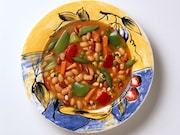Legumes, coffee, tea tied to cardiovascular benefits; added sugars, energy drinks linked to harmful effects
FRIDAY, Aug. 10, 2018 (HealthDay News) — While many dietary patterns, foods, and nutrients receive substantial media attention and are hyped as having cardiovascular benefits, some have evidence for these benefits and others do not, according to a review published in the July 31 issue of the Journal of the American College of Cardiology.
Andrew M. Freeman, M.D., from National Jewish Health in Denver, and colleagues from the American College of Cardiology’s Prevention of Cardiovascular Disease Council reviewed food trends and dietary patterns related to dairy products, added sugars, legumes, coffee, tea, alcoholic beverages, energy drinks, mushrooms, fermented foods, seaweed, plant and marine-derived omega-3 fatty acids, and vitamin B12 in order to provide clinicians with current information for patient discussions in the clinical setting.
The researchers found evidence of harm and recommend limiting or avoiding added sugars and energy drinks. They found a lack of evidence of harm or benefit for dairy products and fermented food and seaweed. They found evidence of benefit for legumes, moderate habitual coffee consumption, tea, mushrooms, alcohol in recommended amounts, plant or marine omega-3 fatty acids, and vitamin B12 supplements for those who are deficient.
“In the search for the ‘perfect’ dietary pattern and foods that provide ‘miracle’ benefits, consumers are vulnerable to unsubstantiated health benefit claims,” the authors write. “As clinicians, it is important to stay abreast of the current scientific evidence to provide meaningful and effective nutrition guidance to patients for atherosclerotic vascular disease risk reduction.”
Several authors disclosed financial ties to the pharmaceutical and food industries.
Copyright © 2018 HealthDay. All rights reserved.








